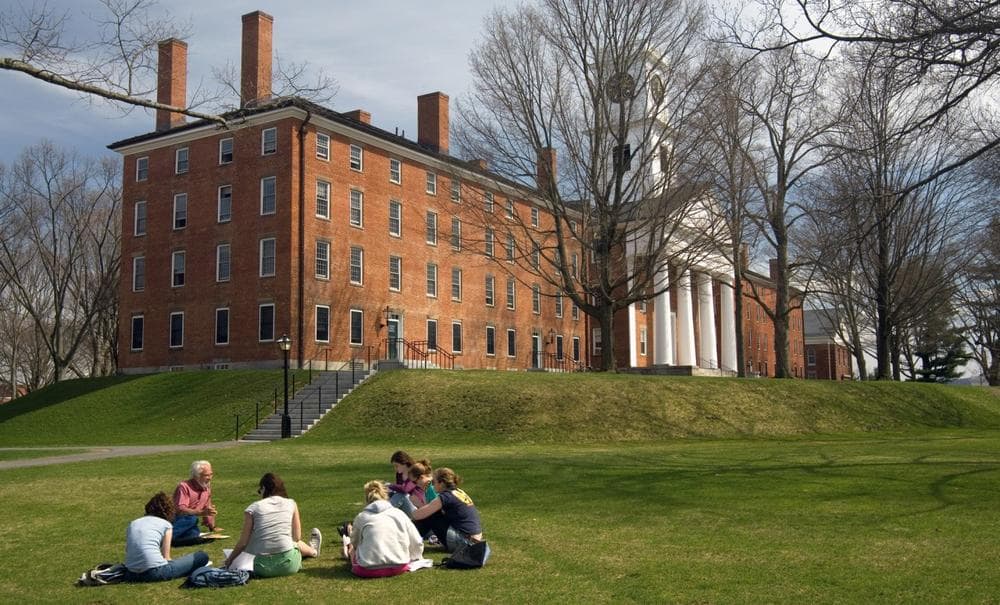Advertisement
Amherst College drops admissions preference for children of alumni

One of Massachusetts’ small colleges made big waves Wednesday: Amherst College will end its use of legacy preferences in selecting its studentsstarting next year.
The practice of favoring the children of alumni in admissions decisions has a momentum of its own. It remains widespread at American colleges and universities — including many, like Amherst, where applicants face acceptance rates of 11% or worse and seek every available edge.
But Amherst’s president, Biddy Martin, says the preference no longer fits with the elite school’s goal of becoming more accessible to talented students regardless of their backgrounds — and is worth courting controversy to leave behind.
In making the change, Amherst joins a small but growing number of colleges that have dropped the practice. Last year, Johns Hopkins University announced it had ended the policy, and Colorado lawmakers banned it at public universities this year. Some prestigious schools say they have never given legacy preference, including the Massachusetts Institute of Technology.
Both Martin and Amherst are well-positioned to make the change now.
Last month, Martin announced she will step down this summer after 11 years as the college’s president. While she said the two decisions arose independently, Martin added that she is glad her successor — yet unnamed — won’t have to deal with “growing pressure to make this change … early on in their stint.”
In 2015, the college’s endowment was the nation’s sixth largest when adjusted for its small enrollment of fewer than 1,800 students. Since then, it has grown by nearly 20%, to nearly $2.6 billion.
So Martin stops short of evangelizing for the change. “It’s the right thing to do for Amherst. We’re doing it because we can,” she said. “We’re not going to be self-righteous about this — especially not in relation to institutions that don’t have the endowment that we have.”
“It’s not only morally wrong, it’s ineffective."
Richard Kahlenberg, senior fellow, The Century Foundation
Legacy preferences have historically been defended as a means of building an alumni community — and a reliable source of gifts — across generations. But some dispute whether the practice serves even that worldly purpose.
“It’s not only morally wrong, it’s ineffective,” said Richard Kahlenberg, a senior fellow at The Century Foundation focused on education equity.
In 2010, three economists, writing in a book that Kahlenberg edited, found “no statistically significant evidence of a causal relationship between legacy preference policies and total alumni giving among top universities."
“University researchers are racking their brains to address social inequality,” Kahlenberg said. Meanwhile, "their own institutions are heaping additional advantage on an already-advantaged group” — namely, the disproportionately white and well-off children of college graduates. “It makes no sense.”
Kahlenberg applauded the change at Amherst, but said it would take more to prompt a national turn away from legacy preferences. The practice is still in use at even the wealthiest universities, including Harvard, Yale and Williams College
Advertisement
Amherst’s board of trustees voted unanimously in favor of the change this past weekend, and other alumni have voiced support. But Martin — like all college presidents, a part-time fundraiser — said the decision felt “hard.”
“There are going to be people who are disappointed … who think that it means we don’t care about our alumni in the same way." Given that roughly one in nine members of recent classes had a parent who also attended Amherst, it comes as a rude awakening.
Then again, this is just the latest step in Amherst’s decades-long effort to shed its 200-year-old aura of wealth and exclusivity. Along with the end of the legacy preference, the college has committed this week to stepping up its investment in financial aid to $71 million a year.
College staff say that will allow admitted students from the least well-off 80% of American households to attend Amherst tuition-free, many with free meals and housing. (But even after that change, 40% of Amherst students wouldn’t receive any aid on the basis of financial need.)
Martin acknowledged that it’s not enough to help students from low- and middle-income families get into Amherst. The college also has to make them feel at home once they’re there. “Changing a culture is certainly slow,” she said. “There will be students that come here from backgrounds that hadn’t been represented well, who will feel culture shock.” Nevertheless, that work is ongoing.
The change will not apply to the current admissions cycle at Amherst — with some early applications already submitted — but will go into effect next fall.
With reporting by The Associated Press
This article was originally published on October 20, 2021.
